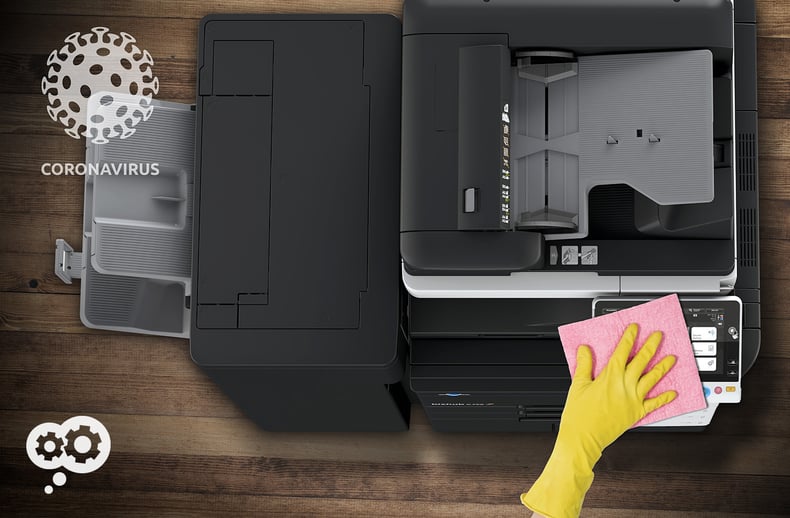
While the series of events surrounding COVID-19 may leave business owners seemingly with their hands tied, there are proactive steps that can alleviate concerns, ensure healthy practices, and sustain productivity for the days and weeks ahead.
As our nation and our world continues to deal with the coronavirus and its impact, small businesses find themselves on the front lines of this outbreak.
From the cancellation of events to dwindling numbers of consumers in public spaces, the well-being of small to medium-sized businesses are being immediately affected. While the series of events surrounding COVID-19 may leave business owners seemingly with their hands tied, there are proactive steps that can alleviate concerns, ensure healthy practices, and sustain productivity for the days and weeks ahead.
7 Proactive Steps SMBs Can Take Amid the Coronavirus Outbreak.
1. Sanitize your office … and your office equipment:
- It can’t be overstated: Sanitize high traffic areas of your office and anything that comes in regular contact with humans — including your office equipment.
- To avoid damaging or clouding your copier/printers, dampen a soft, lint-free cloth with Isopropyl alcohol or use Isopropyl alcohol wipes to clean your equipment.
- Avoid bleach, ammonia or other harsh cleaning solvents as these could damage the display screen of your copier/MFP or printer.
- Provide soap and water and alcohol-based hand rubs in the workplace. Ensure that adequate supplies are maintained. Place hand rubs in multiple locations or in conference rooms to encourage hand hygiene.
2. Actively encourage sick employees to stay home:
- As recommended by Centers for Disease Control and Prevention (CDC), employees who have symptoms of acute respiratory illness are recommended to stay home and not come to work until they are free of fever (100.4° F [37.8° C] or greater using an oral thermometer), signs of a fever, and any other symptoms for at least 24 hours
- Employees should notify their supervisor and stay home if they are sick.
- Employers should maintain flexible policies that permit employees to stay home to care for a sick family member. Employers should be aware that more employees may need to stay at home to care for sick children or other sick family members than is usual.
- As suggested by Harvard Business Review, if COVID-19 becomes widespread in the community, companies can check temperatures using hand-held thermal scanners and consider excluding staff or visitors with temperatures over 100.4 F.
3. Discuss precautionary steps with employees before traveling:
- The CDC suggests advising employees to check themselves for symptoms of acute respiratory illness before starting travel and notify their supervisor and stay home if they are sick.
- Ensure employees who become sick while traveling or on temporary assignment understand that they should notify their supervisor and should promptly call a healthcare provider for advice if needed.
4. Stay connected to your client base:
- Even if they aren’t actively shopping in your store or visiting your office, it’s important to stay connected with your client base.
- Social media can be a powerful tool when well utilized in times such as this. On whatever social platforms you utilize, continue to share actions your company is taking, changes in your policies or operations, and any updates within your community that your clients may find relevant and important.
- Assess your essential functions and the reliance that customers in the community have on your services or products. Be prepared to change your business practices if needed to maintain critical operations (e.g., identify alternative suppliers, prioritize customers, or temporarily suspend some of your operations if needed).
5. Keep everyone internally informed:
- Communicating next steps with your team can drastically decrease panic among employees, and aid in the continued vigilance against the coronavirus pandemic.
- organizations should maintain current phone/text and email contact information for all employees and test organization-wide communication periodically
- Whether through email, SMS, video, or by phone, keep everyone internally informed on any shift in operations, continue to reiterate proper hygiene, wellness, and safety protocols, and maintain an open forum within your organization to address employee concerns or uncertainty.
- Ensure that your sick leave policies are flexible and consistent with public health guidance and that employees are aware of these policies.
6. If your SMB is financially vulnerable, consider the SBA Loan:
- The Small Business Administration (SBA) will work directly with state Governors to provide targeted, low-interest loans to small businesses and non-profits that have been severely impacted by the coronavirus (COVID-19).
- The SBA’s Economic Injury Disaster Loan program provides small businesses with working capital loans of up to $2 million that can provide vital economic support to small businesses to help overcome the temporary loss of revenue they are experiencing.
- For more, visit the SBA online.
7. Research work-from-home technologies:
- With the possibility that a remote workforce could soon become reality, it’s not too late to begin researching available technologies that allow real-time collaboration without sharing an office or workspace.
- If you haven’t already mobilized your workforce with Unified Communications or a similar content management platform, collaborative, cloud-based programs like Microsoft Teams, Skype, and many others can help facilitate ongoing collaboration-rich projects if a remote workforce becomes a reality.
- Speak with your business technology partner about what solutions may be available and relevant to your business.
At Datamax, we want to respond to the technology needs of our customers, as well as the greater needs of our communities.
Our formula includes rapid response to needs, a resourceful resolution to issues, and a real (maximized) return on technology investment. This is never more true than during a time such as this. Is there a way we can be a relevant resource for your SMB and your business technology challenges? Please do not hesitate to reach out!
Source: https://www.cdc.gov/coronavirus/2019-ncov/community/guidance-business-response.html


